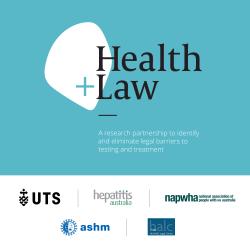New Health+Law research partnership to ensure greater support for people living with HIV and Hepatitis B.


The University of Technology Sydney Faculty of Law has been awarded $2.2 million from the Australian Government’s Blood Borne Viruses (BBV) and Sexually Transmissible Infections (STI) Research Program, to establish a new research partnership to identify and eliminate legal barriers to testing and treatment for people living with HIV and/or Hepatitis B.
The Health+Law research partnership will be led by Chief Investigator Dr David Carter, a UTS Law academic with expertise in health law.
Health+Law will include a consortium of health, community and legal sector bodies: the HIV/AIDS Legal Centre, the Australasian Society for HIV, Viral Hepatitis and Sexual Health Medicine (ASHM), the National Association of People with HIV Australia (NAPWHA) and Hepatitis Australia.


Dr Carter said the partnership will also draw on the expertise of HIV- and hepatitis- related community organisations from across Australia, and people with lived experience of blood-borne viruses.
“It’s an absolute privilege to be working with such an exceptional consortium of organisations and researchers across Australia on this project,” said Dr Carter.
Hepatitis Australia CEO, Carrie Fowlie, said the project will generate high quality, community- owned and -driven data on people’s legal needs and the experiences they face.
“This information will present an alternative to some of the narrower monitoring and surveillance data, which does not always offer a full picture of people’s lives and the diversity of their needs,” Ms Fowlie said.
Aaron Cogle, Executive Director of NAPWHA, said we need to better understand the legal issues facing people living with HIV today, if we’re going to have a chance at ending HIV and improving quality of life for positive people.
“We need to create a legal environment that destigmatises HIV and allows people to talk openly about HIV without fear of prosecution or affecting their migration status. By asking community members directly about their experiences, we will be building a picture about what matters most to them,” he said.
Project, policy and law reform solicitor, Rhys Evans, from the HIV/AIDS Legal Centre, said national strategies for blood-borne viruses and STIs have consistently recognised the need to eliminate the negative impacts of legal issues on people’s health.
“We are excited to see a project that will directly address these goals and create an enabling legal environment, improving access to justice and health outcomes for our clients,” Mr Evans said.
Alexis Apostolellis, CEO of ASHM, said clinicians who support people living with blood-borne viruses know that a range of things happening in a person’s life can affect health outcomes, and that includes legal needs.
“Healthcare workers and legal services both play a vital role in supporting the health and wellbeing of people living with blood-borne viruses, and this project will help build stronger connections between the two,” he said.
Co-Chief Investigator, Dr Anthea Vogl, from UTS Law said the project aims to break new ground in understanding the effects of migration status and Medicare ineligibility on health, testing and treatment.
“These are urgent questions, and critical to our understanding of the relationship between legal needs and health,” Dr Vogl said.
Health+Law will have four principal activities, to be delivered over four consecutive years – 2022‑2026:


- National assessment of enabling legal environment and barriers to testing and treatment: a national survey of people living with HIV or Hepatitis B; in-depth interviews with culturally diverse and Medicare-ineligible priority groups; and technical legal analysis, to create Australia’s first evidence-base of legal barriers and enablers to better health outcomes.
- Understanding the different impacts of legal barriers: an analysis of relative impacts on testing and treatment, quality of life, and health service delivery, to understand priorities for legal support and services, and law and policy reform.
- Development of STI- and Blood-Borne Virus-specific legal needs screening and referral tool and education: the co-design and validation by clinicians, people with lived experience, peers and other key stakeholders of a screening tool and online education support, to help triage legal needs and determine most suitable legal support and services.
- Establishment of national network of specialist STI and Blood-Borne Virus-responsive legal services providers: the setting up of standards, accreditation, and continuing legal education, to increase nation-wide capability for identifying and eliminating legal barriers to testing and treatment.
Professor Anita Stuhmcke, Dean of the Faculty of Law at UTS, said that the faculty is well known for research that generates positive impacts for the communities in which we live and work.
“The bringing together of our partners in the health, community and legal sectors will see the Faculty of Law continue to achieve great impact, improving access to justice, the rule of law and the health of our community.”







































